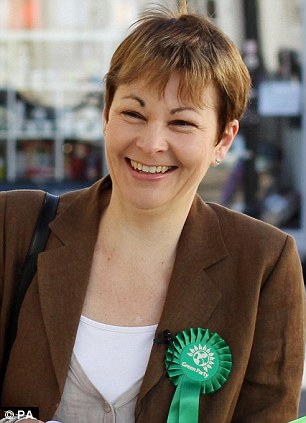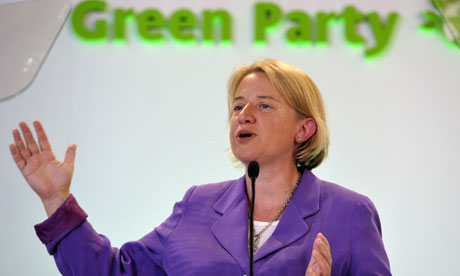James Connelly wrote this article about the last general elections in UK for Yeşil Gazete. James Connelly is a proffesor in Hull University School of Politics, Philosophy & International Studies. Prof. Connelly teaches political theory, contemporary political philosophy and environmental politics. James Connelly is also co-editor of the International Journal of Social Economics. You can find the Turkish translation of this article here, translated by Ayşe Ceren Sarı, the translation editor of Yeşil Gazete. We also thank to Assoc. Prof. Semra Cerit Mazlum for her help and support.
…
The Green Party in the UK General Election of 7th May 2015
The results
The Conservative party won a majority of twelve with 36.7% of the vote (by comparison with 36.1% in 2010). This was regarded as a triumph, primarily because it was so unexpected. Prior to the exit poll (announced as soon as the polls closed) the expectation had been, based on the unanimous verdict of all the polls, that there would be a hung parliament with the Conservatives and Labour on roughly equal shares of votes and seats. The polls were clearly wrong about that, with Labour performing 3 or 4 percent below their predicted vote; the polls, however, accurately predicted the SNP[1], UKIP[2] and Green performances. The small Conservative majority will give the party’s euro-sceptic right wing considerable leverage and potential veto power: David Cameron will probably find the next few years difficult because of the threat posed by the euro-sceptics in the absence of the Liberal Democrats who, during the Coalition, had acted as a convenient buffer.
The Labour vote increased, but only from 29% to 30.4%. The other big losers were the Liberal Democrats, whose vote declined from 23% to 7.9% and their total number of MPs from 57 to 8. UKIP increased its national share of the vote to 12.6%, coming third in the national vote, but they retained only one of their two seats and Nigel Farage failed to win Thanet South. The biggest winner, in seats won and a dramatic shift in party support, was the SNP, who secured 56 out of the 59 Scottish seats, leaving Labour, Liberal Democrats and Conservatives with only one seat apiece in Scotland. Their national share of the vote was only 4.7%, but it was 50% in Scotland, which is the only place they stood for election: hence they benefitted from the single member plurality electoral system which discriminates harshly against parties such as the Greens or UKIP whose support is more evenly spread across the country.
The Green Party
By the time of the election it had been evident for several months that the Green Party would do a lot better at this election than at any previous one, at least if relative success is measured in votes rather than seats. Over the past six months combined membership of the Green Party in the UK has grown to around 70, 000, which is higher than UKIP or the Liberal Democrats. Until recently the party did not have a leader but rather a group of ‘speakers.’ When they decided to switch to a single leader in 2008, Caroline Lucas (elected as MP for Brighton Pavilion in 2010) was chosen. She resigned the post in 2012 to spend more time on her parliamentary duties and was replaced by the Australian born Natalie Bennett.
Following Lucas’s election in 2010, the party focused its efforts in constituencies such as Cambridge, Norwich South, Bristol West and some of the London seats. In the 2015 general election they retained Caroline Lucas’s seat in Brighton with an increased majority, but won no others; in Bristol West they increased their share of the vote by 23% to 26.8%, coming second to Labour (35.7%). Performance elsewhere was patchy, but often creditable, and they were second in four seats. Their total share of the national vote rose to 3.8% from 1% in 2010. The results for the Green Party were not spectacular but they marked definite progress and their first real emergence as serious contenders in a national election.
Green Party Leadership
Natalie Bennett’s performance as leader throughout the election was widely criticized. In one interview early in the campaign she had a moment of ‘brain fade’ and she was regarded as lacklustre and wooden, especially by comparison with Caroline Lucas. However, her performance on the televised debates was competent. In her own seat, Holborn and St Pancras, in London, she came third with 12.8% of the vote, an increase of 10% by comparison with 2010.
Caroline Lucas has gained considerable respect not only in the House of Commons but in the country at large, and is likely to continue as MP for Brighton Pavilion for the foreseeable future. The same cannot be said for the local council, Brighton and Hove, where the Green Party lost its minority control of the council to Labour, who will now run a minority administration: nine Green councillors lost their seats. The Green-led council had been troubled from its beginning – although it should be noted that some, at least, of those troubles were caused by their minority status and intractable problems inherited from their Labour and Conservative predecessors. However, they were seen by many as incompetent, naïve, and a poor advertisement for local green government.
Conclusion
The Green Party performed well in the election. Their leadership was not inspired, but it was competent and their vote rose broadly in line with predictions. They won only one seat: but faced with the obstacle of the British electoral system that already represents success, because it takes one million votes to elect a Green MP by comparison with 26,000 for an SNP MP or 34, 000 for a Conservative MP. In a proportional system they would have won around 24 seats. The challenge is to maintain the momentum – especially as at the next election in 2020 the Liberal Democrat vote will not be collapsing (it cannot collapse much further) and hence the Green Party will not find it easy to gain votes from disgruntled Liberal Democrats.
[1] Scottish National Party
[2] United Kingdom Independence Party
James Connelly – Hull University
(Yeşil Gazete)

















Comments